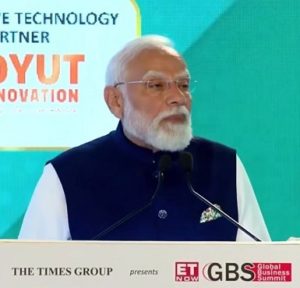
Last Updated on December 21, 2024 1:10 pm by BIZNAMA NEWS
GST council also recommends to fully exempt GST on gene therapy
GST Council recommends exemption of GST on contributions by general insurance companies from third-party motor vehicle premiums for Motor Vehicle Accident Fund
GST Council recommends no GST on transaction of vouchers as they are neither supply of goods nor supply of services. The provisions related to vouchers is also being simplified.
GST Council clarifies that no GST is payable on ‘penal charges’ levied and collected by banks and NBFCs from borrowers for non-compliance with loan terms
GST Council recommends reduction of payment of pre-deposit for filing an appeal before the Appellate Authority in respect of an order passed which involves only penalty amount

AMN
Several decisions have been taken related to Goods and Service tax – GST in the 55th meeting of the GST Council held in Jaisalmer of Rajasthan today. The meeting was chaired by Union Finance Minister Nirmala Sitharaman. It was attended by the Chief Ministers, Deputy Chief Ministers, State Finance Ministers and officials of the Ministry of Finance.
Later, addressing a press conference Ms. Sitharaman said, the GST Council has decided rate cut on fortified rice kernels to 5 per cent and recommends amendment to definition of pre-packaged and labelled items. She said, the GST Council has decided to reduce or exempt tax rates on many items. Ms. Sitharaman said that the Gene-therapy has been exempted from GST. Also, GST will not be levied on the penal charges, late payment fees of banks and NBFCs. She said that it has also been decided to exempt the training partners of the National Skill Development Council from GST, but this decision will come into effect after the notification is issued.
The Finance Minister said that the states have opposed bringing Air Turbine Fuel (ATF) under the purview of GST, so no decision has been taken on it . The Group of Ministers will work further on reducing the GST rate on health insurance. The Finance Minister said that there was also a discussion about the tax on the delivery platform, but no decision has been taken. Ms. Sitharaman said that today the Council has given in-principle approval on the concept note to remove the difficulties faced in the registration of small companies.
The proposal to reduce Goods and Services Tax (GST) on delivery charges for food ordered through e-commerce platforms has been deferred. The Council deferred discussions on insurance matters after the GoM reported a lack of consensus on the issue.
Other changes relating to goods and services
1. To increase the GST rate from 12% to 18 % on sale of all old and used vehicles, including EVs other than those specified at 18% -Sale of old and used petrol vehicles of engine capacity of 1200 cc or more & of length of 4000 mm or more; diesel vehicles of engine capacity of 1500 cc or more & of length of 4000 mm and SUVs.[Note: GST is applicable only on the Value that represents Margin of the Supplier, that is, the difference between the Purchase price and Selling price (depreciated value if depreciation is claimed) and not on the value of the vehicle. Also, it is not applicable in case of unregistered persons.]
2. To clarify that Autoclaved Aerated Concrete (ACC) blocks containing more than 50% fly ash content will fall under HS 6815 and attract 12% GST.
3. To clarify that pepper whether fresh green or dried pepper and raisins when supplied by an agriculturist is not liable to GST.
4. To amend the definition of ‘pre-packaged and labelled’ to cover all commodities that are intended for retail sale and containing not more than 25 kg or 25 litre, which are ‘pre-packed’ as defined under the Legal Metrology Act, or a label affixed thereto is required to bear the declarations under the provisions of the Act and rules.
5. To clarify that ready to eat popcorn which is mixed with salt and spices are classifiable under HS 2106 90 99 and attracts 5% GST if supplied as other than pre-packaged and labelled and 12% GST if supplied as pre-packaged and labelled. However, when popcorn is mixed with sugar thereby changing its character to sugar confectionary (eg caramel popcorn), it would be classifiable under HS 1704 90 90 and attract 18% GST. It has been decided to regularise the issues for the past on “as is where is” basis.(Note: There is no new imposition of any tax in this regard and is merely a clarification as certain field units were demanding different tax rates on the same. Therefore, it is a clarification being recommended by the GST Council to settle the disputes arising out of interpretation.)
6. To clarify that the Explanation in Sl. No. 52B in notification No. 1/2017- Compensation Cess (Rate) dated 28.6.2017 regarding ground clearance is applicable with effect from 26.07.2023.
7. To clarify that RBI regulated Payment Aggregators are eligible for the exemption under entry at Sl. No. 34 of notification No. 12/2017-CT(R) dated 28.06.2017 since they fall within the ambit of ‘acquiring bank’ as defined in the said entry. To also clarify that this exemption does not cover payment gateway (PG) and other fintech services which do not involve settlement of funds.
8. To clarify that no GST is payable on the ‘penal charges’ levied and collected by banks and NBFCs from borrowers for non-compliance with loan terms.
B. MEASURES FOR FACILITATION OF TRADE
1. Amendment in Schedule III of CGST Act, 2017
- To insertclause (aa) in paragraph 8 of Schedule III of the CGST Act, 2017w.e.f.01.07.2017, to explicitly provide that supply of goods warehoused in a Special Economic Zone (SEZ) or Free Trade Warehousing Zone (FTWZ) to any person before clearance of such goods for exports or to the Domestic Tariff Area, shall be treated neither as supply of goods nor as supply of services.
- This brings transactions relating to supply of goods warehoused in SEZ/FTWZ at par with the existing provision in GST for transactions in Customs bonded warehouse.
2. Issues pertaining to taxability of Vouchers
In a significant move to address long-standing concerns regarding the taxability of vouchers under GST, the GST Council made the following recommendations:
- To omit sections 12(4) and 13(4) from CGST Act, 2017 and rule 32(6) from CGST Rules, 2017 to resolve ambiguities in the treatment of vouchers.
- To issue clarification on the following issues:
- Transactions in vouchers shall be treated neither as a supply of goods nor as a supply of services.
- Distribution of vouchers on principal-to-principal basis shall not be subject to GST. However, where vouchers are distributed on principal-to-agent basis, the commission/fee or any other amount charged by the agent for such distribution is taxable under GST.
- Additional services such as advertisement, co-branding, marketing and promotion, customization and technology support, customer support etc. related to vouchers would be leviable to GST on the amount paid for these services.
- Unredeemed vouchers (breakage) would not be considered as supply under GST and no GST is payable on income booked in the accounts in respect of breakage.
3. Issuance of clarifications through the circulars to remove ambiguity and legal disputes in certain issues.
- To issue circulars to provide clarity in the following issues due to varied interpretations by the field formations:
- Clarification regarding requirement of reversal of Input Tax Credit by electronic commerce operators in respect of supplies made under section 9(5) of CGST Act, 2017: The GST Council recommended that no proportional reversal of ITC under section 17 (1) or section 17 (2) of CGST Act, 2017 is required to be made by the ECO in respect of supplies for which they are required to pay tax under section 9(5) of CGST Act, 2017.
- Clarification on availability of Input Tax Credit as per section 16(2)(b) of CGST Act, 2017 in respect of goods which have been delivered by the supplier at his (supplier’s) place of business : The GST Council recommended to clarify that in an Ex-Works contract, where goods are delivered by the supplier to the recipient or a transporter at the supplier’s place of business, and the property in goods transfers to the recipient at that point, the goods are considered to be “received” by the recipient under section 16(2)(b) of CGST Act, 2017 and the recipient may claim Input Tax Credit (ITC) on such goods, subject to the conditions outlined in Sections 16 and 17 of the CGST Act, 2017.
- Clarification regarding applicability of late fee for delay in furnishing of FORM GSTR-9C and providing waiver of late fee on delayed furnishing of FORM GSTR-9C for the period from 2017-18 to 2022-23:
- The GST Council recommended to clarify through a circular that the late fee under Section 47(2) of the CGST Act, 2017 is leviable for the delay in filing the complete annual return under Section 44 of the CGST Act, 2017, which includes both FORM GSTR-9 (Annual Return) and FORM GSTR-9C (Reconciliation Statement), where applicable.
- For the annual returns pertaining to the period 2017-18 to 2022-23, the GST Council also recommended to issue notification under section 128 of CGST Act, 2017 for waiver of the amount of late fee for delayed filing of FORM GSTR-9C, which is in excess of the amount of late fee payable till the date of filing of FORM GSTR-9 for the said financial years, provided the said FORM GSTR-9C is filed on or before 31st March 2025.
C. MEASURES FOR STREAMLINING COMPLIANCES IN GST
1. Insertion of new provision for Track and Trace Mechanism
- To insert an enabling provision in CGST Act, 2017 through Section 148A so as to empower the Government to enforce the Track and Trace Mechanism for specifiedevasion prone commodities.
- The system shall be based on a Unique Identification Marking which shall be affixed on the said goods or the packages thereof. This will provide a legal framework for developing such a system and will help in implementation of mechanism for tracing specified commodities throughout the supply chain.
2. Clarification regarding recording of correct details of name of the State of the un-registered recipient as well as correct declaration of place of supply in respect of supply of ‘Online Services’
- To clarify that in respect of supply of ‘Online Services’ such as supply of online money gaming, OIDAR services, etc. to unregistered recipients, the supplier is required to mandatorily record the name of the State of the unregistered recipient on the tax invoice and such name of State of recipient shall bedeemed to be the address on record of the recipient for the purpose of section 12(2)(b) of IGST Act, 2017 read with proviso to rule 46(f) of CGST Rules, 2017
D. OTHER MEASURES PERTAINING TO LAW & PROCEDURE
1. Amendment in section 17(5)(d) of CGSTAct, 2017
- To align the provisions of section 17(5)(d) of CGST Act, 2017 with the intent of the said section, the Council has recommended amending section 17(5)(d) of CGST Act, 2017, to replace the phrase “plant or machinery” with “plant and machinery”, retrospectively, with effect from 01.07.2017, so that the said phrase may be interpreted as per the Explanation at the end of section 17 of CGST Act, 2017.
2. Amendment in section 107 and section 112 of CGST Act, 2017 to provide for payment of pre-deposit for filing an appeal in respect of an order passed which involves only penalty amount.
- To amend the proviso to section 107(6) of CGST Act, 2017 providing for payment of pre-deposit at 10% instead of 25 %for filing appeals before Appellate Authority in cases involving only demand of penalty without involving the demand of tax.
- To insert a new proviso to section 112(8) of CGST Act, 2017 providing for payment of pre-deposit at10%for filing appeals before Appellate Tribunalin cases involving only demand of penalty without involving the demand of tax.
3. Amendment in section 2(69) of CGST Act, 2017 to insert an Explanation regarding definitions of Local Fund and Municipal Fund: To amend clause (c) of section 2(69) of CGST Act, 2017 and to insert an Explanation under the same to provide for definitions of the terms ‘Local Fund’ and ‘Municipal Fund’ used in the said clause.
4. Amendment in provisions pertaining to Input Services Distributor (ISD) mechanism under CGST Act, 2017 and CGST Rules, 2017
- Toamend Section 2(61) and Section 20(1) of the CGST Act, 2017 to explicitly include inter-state RCM transactions under the ISD mechanism by including reference to supplies subject to tax under section 5(3) and 5(4) of IGST Act, 2017 in the said provisions.
- Consequentially, to amend section 20(2) of CGST Act, 2017 and rule 39(1A) of the CGST Rules, 2017.
- These, amendments in CGST Act, 2017 are to be made effective from 01.04.2025.
5. Provision for grant of Temporary Identification Number by Tax Officers to persons, not liable to be registered otherwise
- To insert new rule 16A in CGST Rules, 2017 to provide for a separate provision for generation of temporary identification number for persons, who are not liable to be registered under CGST Act, 2017 but are required to make any payment as per rule 87(4) of CGST Rules, 2017.
- To amend Rule 87 (4) of CGST Rules, 2017 incorporating a reference to the new Rule and consequential modification of FORM GST REG-12.
6.Amendment in the field ‘category of registered person’ for taxpayers who opted for composition levy through FORM CMP-02
- Toamend sub-rule (1) of rule 19 of CGST Rules, 2017 to include reference to FORM GST CMP-02 in the said rule toallow thetaxpayers to modify their “category of registered person” in Table 5 of FORM GST CMP-02throughFORM GST REG-14.
- Amendment in CGST Act, 2017 and CGST Rules, 2017 in respect of functionality of Invoice Management System (IMS)
- The GST Council recommended inter-alia-
- To amend section 38 of CGST Act, 2017 and rule 60 of CGST Rules, 2017 to provide a legal framework in respect of generation of FORM GSTR-2B based on the action taken by the taxpayers on the Invoice Management System (IMS).
- To amend section 34(2) of CGST Act, 2017, to specifically provide for requirement of reversal of input tax credit as is attributable to a credit note, by the recipient, to enable the reduction of output tax liability of the supplier.
- To insert a new rule 67B in CGST Rules, 2017, to prescribe the manner in which the output tax liability of the supplier shall be adjusted against the credit note issued by him.
- To amend section 39 (1) of CGST Act, 2017 and rule 61 of CGST Rules, 2017 to provide that FORM GSTR-3B of a tax period shall be allowed to be filed only after FORM GSTR-2B of the said tax period is made available on the portal.
E. OTHER MEASURES:
- The GST Council approved the recommendation of the committee of officers suggesting measures for the various issues raised by the States in respect of issues pertaining to IGST settlement and asked the committee to conclude the desired changes by March, 2025.
- The GST Council took note of the procedural rules proposed for the internal functioning of the GSTAT, which would be notified after examination by the Law Committee. This would help in operationalization of the GSTAT.
- The Council also decided to extend the time frame for the Group of Ministers on the restructuring of the GST Compensation till 30th June, 2025.
- On the request of State of Andhra Pradesh the Council recommended that a Group of Ministers be constituted to examine the legal and structural issues, and recommend a uniform policy on imposition of levy in case of a natural disaster/calamity in the State.
The issue of whether charges collected by municipalities for granting FSI including additional FSI, chargeable to GST on reverse charge basis was brought up in the Council. The matter was deferred for further examination on the behest of the Central Government on the ground that this amount relates to Municipalities or local authority.
Note: The recommendations of the GST Council have been presented in this release containing major item of decisions in simple language for information of the stakeholders. The same would be given effect through the relevant circulars/ notifications/ law amendments which alone shall have the force of law.







